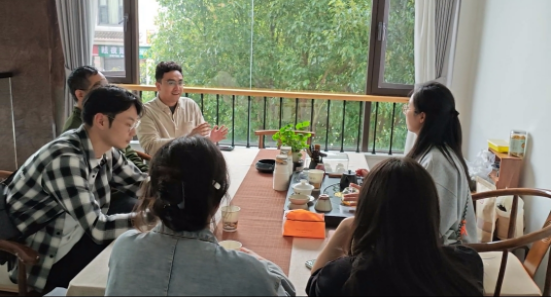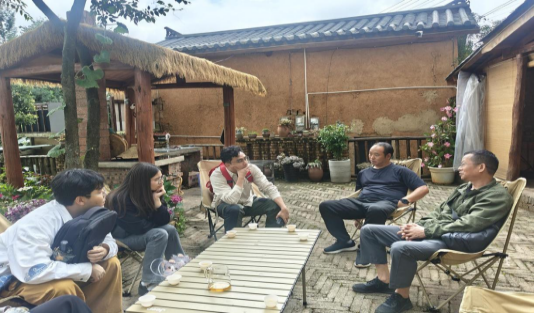《全球旅游伦理规范》为旅游行业的可持续发展提供了全面的指导框架,涵盖了旅游对社会、文化、环境和经济等多方面的影响及责任。昆明学院旅游学院烹饪与营养教育专业2023级学生在杨为宗和周楷麟老师的带领下,赴云南省曲靖市马龙区土瓜冲村——云南乡村旅居示范村,开展以“美食赋能乡村振兴,伦理引领饮食文化”为主题的暑期社会实践活动。本次活动紧密结合《全球旅游伦理规范》中关于“资源可持续利用”“文化遗产保护”和“社会责任”等原则,烹饪专业师生通过实地调研、技艺展示、文化传播等方式,深入推动乡村旅游与饮食文化的融合发展,具体实践如下:
一、践行可持续发展“资源节约与可持续利用”原则
烹饪与营养专业师生深入土瓜冲村当地农户,调研并采购本地生态食材(如马龙苹果、土鸡、野生菌等),在烹饪过程中强调“物尽其用”,减少食材浪费,向当地村民推广“零废弃厨房”理念,契合《全球旅游伦理规范》中“节约稀有资源”的要求。师生向村民介绍使用节能灶具、控制用水用电,推广环保烹饪方式,降低碳排放,体现对环境负责的烹饪理念。
二、推动“饮食文化遗产保护与传承”原则
团队走访当地美食博主“小五哥家常菜”,学习并记录本土家常菜制作工艺,并结合现代营养学知识进行菜谱优化与创新,既保留传统风味,又提升菜品健康价值,体现对饮食文化的尊重与传承。师生通过向村民和游客展示云南特色菜肴制作过程,讲解其文化背景与营养价值,增强公众对地方饮食文化的认同感与保护意识。
三、推动“促进社会责任与公平”原则
师生应用烹饪与营养在与当地旅居项目相关负责人分享了食品安全与营养知识,对从原料采购、储存、加工到成品出品,全程把控卫生质量,给出了建议,确保食品安全的同时,也提升了公众对餐饮行业的信任度。学生们还建议打造“暖心厨房”公益项目,为社区老人、留守儿童提供营养餐食。这次活动不仅锻炼了专业技能,也体现了烹饪专业学生的社会责任感,符合规范中“旅游(餐饮)应服务于社会公益”的精神。
四、助力当地“乡村旅游与产业融合”发展
师生通过调研土瓜冲村旅居项目运营模式,结合烹饪专业优势,提出了“美食+旅居”融合发展的建议。核心思路是将美食文化与乡村旅游深度结合,推动农旅融合与乡村振兴。
具体举措包括开发特色餐饮体验课程,依托土瓜冲村的自然资源和地方特色,开设具有互动性的地方传统美食烹饪课程,让游客亲自参与制作,提升体验感;同时,挖掘村庄的特色食材和烹饪技艺,打造具有地方特色的美食IP,如地方小吃和农家宴等,形成独特的旅游品牌;此外,通过定期举办美食文化节庆活动,将乡村的节庆与美食结合,吸引游客并加深对地方文化的理解。最终,通过农旅融合模式,让游客体验“从田间到餐桌”的全过程,既丰富了旅游内容,又为乡村振兴注入新的活力。
本次实践中,烹饪专业师生以《全球旅游伦理规范》为指引,将专业技能与乡村振兴、饮食文化传承紧密结合,不仅提升了学生的实践能力与伦理意识,也为土瓜冲村的乡村旅游发展提供了美食文化支撑。未来,烹饪专业将继续深化“伦理引领、技艺赋能、文化传承”的教育理念,为促进可持续旅游与饮食产业发展贡献更多力量。


Students in Cooking and Nutrition Education actively apply the principles of the Global Code of Ethics for Tourism in their practical endeavors
The Global Code of Ethics for Tourism provides a framework to guide the sustainable development of the tourism industry by addressing its social, cultural, environmental, and economic impacts. Guided by Professors Yang Weizong and Zhou Kailin, students from the 2023 Culinary and Nutrition Education program at Kunming University’s School of Tourism conducted a summer social practice project in Tuguachong Village, Malong District, Qujing City, Yunnan Province—a model for rural tourism. The event, themed "Empowering Rural Revitalization through Gourmet Cuisine and Promoting Food Culture via Ethical Practices," reflected the principles of the Global Code of Ethics for Tourism, especially those related to sustainable resource use, cultural heritage preservation, and social responsibility. Through field research, culinary demonstrations, and cultural outreach, the team promoted the integration of rural tourism and food culture. The implementation strategies are as follows:
Ⅰ. Promote sustainable development by upholding the principle of "resource conservation and sustainable utilization"
Teachers and students from the program of Culinary and Nutrition conducted field research in Tuguachong Village, working with local farmers to source native ecological ingredients such as Malong apples, native chickens, and wild mushrooms. They promoted a "zero-waste kitchen" by applying the principle of "making the best use of everything" during cooking, aiming to reduce food waste. This effort supports the "conserving scarce resources" principle of the Global Code of Ethics for Tourism. The team also introduced energy-efficient stoves, taught villagers how to manage water and electricity use, and encouraged eco-friendly cooking methods, all contributing to lower carbon emissions and demonstrating a commitment to sustainable culinary practices.
II. Promoting the principle of "preserving and transmitting dietary cultural heritage."
The team visited the local food blogger "Xiaowuge's Home Cooking" to learn and document traditional home-cooked dish techniques. Using modern nutritional knowledge, they optimized and innovated the recipes, preserving traditional flavors while improving nutritional value. This showed respect for and continued local culinary culture. Teachers and students also demonstrated how to prepare Yunnan’s signature dishes to villagers and tourists, explaining their cultural and nutritional value, which helped raise public awareness and appreciation of local food heritage.
III. Promoting the principle of "Promotion of Social Responsibility and Equity"
Teachers and students specializing in culinary arts and nutrition shared food safety and nutrition knowledge with the local catering project manager. They recommended strict hygiene controls from raw material procurement and storage through processing to final delivery, to ensure food safety and build public trust in the catering industry. Students also proposed a public initiative called the "Warm Heart Kitchen" to provide nutritious meals to elderly people and left-behind children. This event enhanced students’ professional skills, demonstrated the social responsibility of culinary students, and aligned with the principle that catering should serve the public interest, as stated in relevant guidelines.
IV. Support the local development of the "integration of rural tourism and related industries"
Teachers and students examined the sojourn project’s operations in Tuguachong Village. Using the culinary program’s strengths, they suggested integrating food culture with rural tourism through a "food + sojourn" model. This approach aims to promote the coordinated development of agriculture, tourism, and rural revitalization.
Specific measures include developing distinctive catering and experiential courses. By leveraging Tuguachong Village’s natural resources and local characteristics, interactive traditional cooking programs are offered, allowing tourists to participate in food preparation and enhance their overall experience. Local ingredients and traditional techniques are used to create signature dishes, such as regional snacks and rural banquets, helping to build a unique tourism brand. In addition, regular food festivals combine rural celebrations with gastronomy, attracting visitors and deepening their cultural understanding. Ultimately, the integration of agriculture and tourism enables guests to experience the full "field to table" journey, enriching tourism offerings and supporting rural revitalization.
Under the Global Code of Ethics for Tourism, teachers and students in the culinary program combined professional skills with rural revitalization and food culture preservation. This effort enhanced students’ practical abilities and ethics while supporting rural tourism development in Tuguachong Village. Going forward, the program will continue to promote the philosophy of “ethical guidance, skill empowerment, and cultural inheritance” to contribute to sustainable tourism and food industry growth.